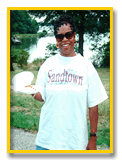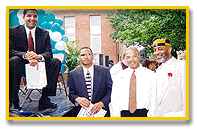











|
|


In the Name of Community:
The Role of Community in Urban Transformation
By Sebastian R. Alexander
 In order for the transformation of any community to be successful, the community itself must play an active role. If the said community - with all its block captains and community association officials - is not playing an active role, they have no right nor need to complain. When community isn't active in the cleaning of crime and grime, others make the decisions. These decisions, hence, do not always reflect what the community feels is right. In order for the transformation of any community to be successful, the community itself must play an active role. If the said community - with all its block captains and community association officials - is not playing an active role, they have no right nor need to complain. When community isn't active in the cleaning of crime and grime, others make the decisions. These decisions, hence, do not always reflect what the community feels is right.
A community cannot afford to allow others, particularly those who are of a different or higher class, to make decisions on its behalf. For these individuals, who often represent a major economic interest, often lack a true understanding of what is best, of what fits, of what a community really likes.
No one can go into someone else's home and tell them how to live. They can only lend their support via finances and technical assistance. It is the community that needs to spearhead any efforts to make changes.
 The onus is thus on the community to step up to the plate and tell leaders from non-profits and other organizations exactly what it is that the community desires.
The problem is when the community does not step up and such leaders are left to do as they see fit, including what to do with the money. And money is always a critical issue. Will the money go into a development project where so and so's friend is the contractor? Will the funds go to hiring a friend of a friend as opposed to community residents who demonstrate a knack for the job, particularly with respect to leadership and CEO positions? Will the funds go into a housing contract that ultimately leads to construction jobs from members of the given community? Or will jobs go to members of other communities? The onus is thus on the community to step up to the plate and tell leaders from non-profits and other organizations exactly what it is that the community desires.
The problem is when the community does not step up and such leaders are left to do as they see fit, including what to do with the money. And money is always a critical issue. Will the money go into a development project where so and so's friend is the contractor? Will the funds go to hiring a friend of a friend as opposed to community residents who demonstrate a knack for the job, particularly with respect to leadership and CEO positions? Will the funds go into a housing contract that ultimately leads to construction jobs from members of the given community? Or will jobs go to members of other communities?
When community people do not step up to the plate and determine who will be hired for particular positions, ulterior motives come into play. It is just a fact of human nature. The strong get the meat, and the weak get the leftovers. These individuals only pay lip-service to the process of community empowerment and perpetuate fraudulent thinking.
The solution is for community residents to go to meetings, make phone calls, and, definitely, write letters to the mayor, the housing commissioner, the newspapers, the television stations and the neighbor next door. The solution is having a community newspaper, radio show, website and cable access television show to keep people informed of news, job openings, new treatment centers, financial workshops, as well as business and housing opportunities. The solution is the community taking their habitat seriously enough to step to a drug dealer on one's corner and kindly asking him or her to leave.
 The solution is in taking some brooms and shovels and cleaning those dirty areas. The solution is being an active member of the PTA at their child's school. The solution is having a prayer rally in the middle of the largest open-air drug market in West Baltimore. The solution is in men and women acting their age and taking their community by the horns. The solution is in stating one desires to be on the community association board. And the solution is also in having one's child at those community meetings so as to continue building the next generation's leaders. The solution is in taking some brooms and shovels and cleaning those dirty areas. The solution is being an active member of the PTA at their child's school. The solution is having a prayer rally in the middle of the largest open-air drug market in West Baltimore. The solution is in men and women acting their age and taking their community by the horns. The solution is in stating one desires to be on the community association board. And the solution is also in having one's child at those community meetings so as to continue building the next generation's leaders.
When a organization or non-profit grants money to a community group, just as in aide to other countries, there are certain stipulations. Community members must realize that this makes communities vulnerable.
Communities must be careful so as to not relinquish their sovereignty - just as in the IMF's financial resources to developing nations in Africa. When groups give money, it is not a bad idea to understand what is in it for them. This usually begins the revelation of altruism or deceiver. Every individual or group lending assistance does not always have the best interest of the community.
Too often, these groups are out to make money and will do all that is necessary to actually continue dependence - just as in Africa.
Communities around the world ought desire autonomy and independence - all the while realizing the interdependence of al1. In addition, they should always be mindful of those who come - "in the name of community" - to further exploit an already struggling entity. Further, if those groups cannot help to truly empower, they should pack up their things and go home. Community people, however, must be in the loop so as to monitor such actions and to step and tell what it is that the community needs.
ICB Links
- Beltran Navarro: bnavarro@sprynet.com
- Black Professional Men, Inc. www.bpminc.org
- Steve Cupid Theodore, Editor, Baltimore Afro American Newspaper: stheodore@afroam.org
- Anthony McCarthy, Publisher, Baltimore Times Newspaper: am91100@aol.com
- Gary Witherspoon, Editor, Baltimore Sun Newspaper: gary.witherspoon@baltsun.com
- Morgan State University: http://www.morgan.edu
- Coppin State College: http://www.coppin.edu/
- Morehouse College: http://www.morehouse.edu/
- David Miller, M. Ed.: www.urbanyouth.org
- agoodblackman.com: www.agoodblackman.org
- Dr. Manning P. Marable, Columbia University,
"Along the Color Line": www.manningmarable.net
- Thomas Fleming, Sun: http://www.sfmuseum.org/sunreporter/fleming.html
ICB Directory
- Arena Players, 801 McCulloh Street, 410.728.6500
- Central District Neighborhood Service Center
Community Lending Group/Empower Baltimore Track II Loan Fund, 2526 N. Charles Street, 410.235.8100
- Community Lending Group/Micro-Enterprise Loan Program, 2526 N. Charles Street, 410.243.7900
- Coppin Heights CDC, 2601 W. North Avenue, 410.462.2080
- Coppin State College, 2500 W. North Avenue, 410.383.5400
- Druid Heights CDC, 1821 McCulloh Street, 410.523.2350
- Druid Hill Avenue YMCA, 1609 Druid Hill Avenue, 410.728.1600
- East Harbor Village Center, 250 S. Broadway Street, 410.534.6522
- EDEN Jobs, 1300 N. Fulton Avenue, 410.728.2090
- Empower Baltimore Management Corporation, 34 Market Place, 410.783.4400
- Empower Baltimore's One Stop Capital Shop for Businesses/SBA, 34 Market Place, 410.783.4222
- Harlem Park/Lafayette Square Empowerment Zone Village Center, Edmonson & Carey, 410.225.9179 or 225.7023
- Historic East Baltimore Community Action Coalition, 808 N. Chester Street, 410.614.4216
- Housing Hotline/Home Ownership Counseling, 410.332.1386
- Penn-North Acupuncture Center, Pennsylvania Avenue, 410.728.2080
- Martha's Place Transition House for Women, Pennsylvania & Fremont, 410.728.8402
- Maryland Volunteer Lawyers Service, 16 South Calvert Street, 410.539.6800 ext.250
- New Song Family Health Center, 1300 N. Fulton Avenue, 410.728.5600
- New Song Learning Center/Academy, 1385 N. Gilmor Street, 410.728.2091 New Song Arts & Media Center, 410.728.3132
- Neighborhood Housing Services of Coppin Heights, 2601 W. North Avenue, 410.669.2634
- Penn-North Revitalization Corporation, Pennsylvania and Fulton Aves., 410.462.3883
- Sandtown Habitat for Humanity, 1300 N. Fulton Avenue, 410.669.3309
- Sandtown-Winchester Transformation/CBP, 1135-37 N. Gilmor, 410.728.8607 or 728.8608
- Self Motivated Community Peoples Empowerment Zone Village Center, 1114 N. Mount Street, 410.383.2960 or 383.8550
Shake-n-Bake, 1601 Pennsylvania Avenue, 410.669.9100
- The Avenue Market, 1700 Pennsylvania Avenue, 410.728.1012
- The GATE Career Center, 301 N. Gay Street, 410.752.3200
- The Men's Center, 2222 Jefferson Street, 410.614.5353
- The Men's Health Center, 1515 W. North Avenue, 410.396.0138
- UMAR Boxing, 1515 N. Fulton Avenue, 410.728.3500 or 728.3600
- Village of Poppleton, Empowerment Zone, 1223 W. Baltimore Street, 410.539.5274
- Village ViewPoint Newspaper, 1133 N. Gilmor, 410.728.8307
- Vision For Health, 1137 N. Gilmor Street, 410.728.8230 or 728.0513
- Washington Village/Pigtown Neighborhood Planning Council, 904 Washington Boulevard, 410.837.4400 or 385.0496
Back to top
about STL l About Doni Glover l The Glover Report
Simmba l Intra-Community Beat l Roots & Culture
The Observer l Networker l Urban Diaspora
Contact Us
©2000 Sandtown Live. All Rights Reserved.
Web Design by The Camera-Ready Cafe`
|
